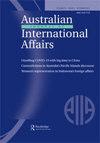在突发卫生事件中,我们能依靠安全理事会吗?
IF 1.8
3区 社会学
Q2 INTERNATIONAL RELATIONS
引用次数: 0
摘要
在通过有关艾滋病毒/艾滋病、埃博拉和COVID-19的决议时,安理会至少暂时对卫生问题表现出了兴趣,并呼吁在全球疾病应对中发挥更重要的作用。在这份报告中,我回顾了安理会20年来处理突发卫生事件的工作,我建议我们应谨慎行事,不要让安全理事会在应对大流行病方面过于重要。我着重谈安理会的三个问题:它高度政治化,分歧严重,这意味着不能指望它在最需要的时候采取行动;一旦一个新出现的问题已经演变成全球危机,当它确实采取行动时,往往为时已晚;而且,它在任何情况下都不一定拥有可以作出有意义贡献的工具。相反,我认为,正是联合国安理会作为一个“健康领域的局外人”的角色,使它能够偶尔做出贡献。把应对危机的真正责任交给这样一个机构,确实是有风险的。这项任务更有可能由世卫组织这样的机构孜孜不倦地完成(尽管往往不完美)。本文章由计算机程序翻译,如有差异,请以英文原文为准。
Can we rely on the Security Council during health emergencies?
ABSTRACT In passing resolutions on HIV/AIDS, Ebola and COVID-19, the Security Council has shown at least a passing interest in health, and calls have been made to give it a more central role in global disease response. In this contribution, reflecting on two decades of the UNSC’s engagement with health emergencies, I suggest we should be cautious about making the Security Council too central to pandemic response. I focus on three problems with the Council: that it is highly politicised and deeply divided in ways that mean it cannot be relied on to act when needed most; that when it does act it tends to do so too late, once an emerging problem has already become a global crisis; and that it does not in any case necessarily have the tools at its disposal to make a meaningful contribution. Instead, I argue, it is precisely its role as a ‘health outsider’ that enables the UNSC to occasionally make a contribution. It would be risky indeed to hand such a body real responsibility for crisis response. That is a task much more likely to be performed assiduously (if often imperfectly) by a body such as the WHO.
求助全文
通过发布文献求助,成功后即可免费获取论文全文。
去求助
来源期刊

Australian Journal of International Affairs
INTERNATIONAL RELATIONS-
CiteScore
3.20
自引率
13.30%
发文量
44
期刊介绍:
AJIA is the journal of the Australian Institute of International Affairs. The Institute was established in 1933 as an independent and non-political body and its purpose is to stimulate interest in and understanding of international affairs among its members and the general public. The aim of the Australian Journal of International Affairs is to publish high quality scholarly research on international political, social, economic and legal issues, especially (but not exclusively) within the Asia-Pacific region. The journal publishes research articles, refereed review essays and commentary and provocation pieces. ''Articles'' are traditional scholarly articles. ‘Review essays’ use newly published books as the basis to thematically examine current events in International Relations. The journal also publishes commentaries and provocations which are high quality and engaging pieces of commentary, opinion and provocation in a variety of styles. The Australian Journal of International Affairs aims to analyse international issues for an Australian readership and to present Australian perspectives to readers in other countries. While seeking to stimulate interest in and understanding of international affairs, the journal does not seek to promote any particular policies or approaches. All suitable manuscripts submitted are sent to two referees in a full ''double blind'' refereeing process.
 求助内容:
求助内容: 应助结果提醒方式:
应助结果提醒方式:


